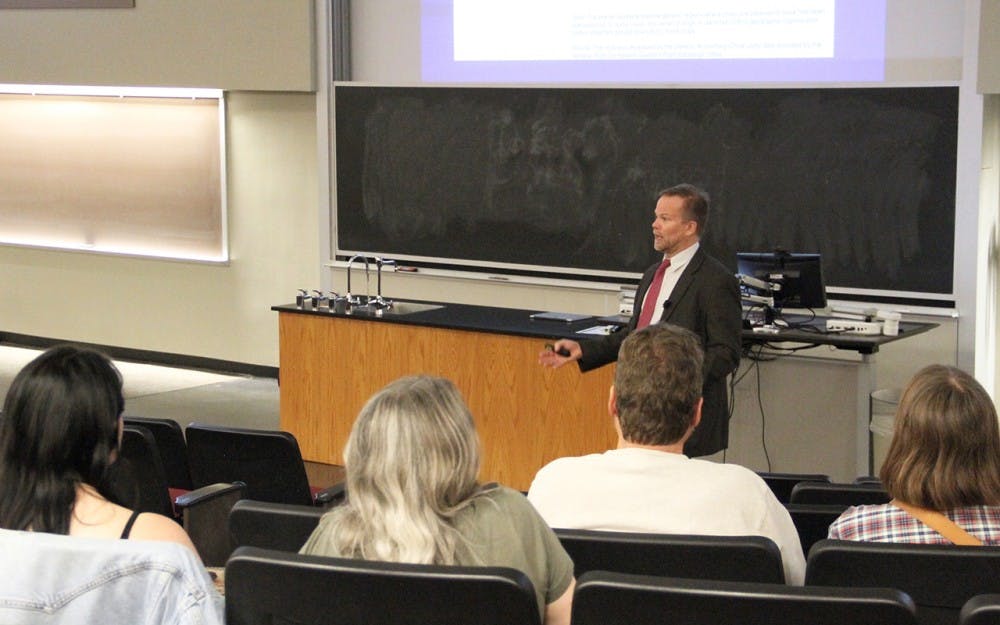Genetic engineering might seem like a vision from a dystopian future, but it’s been with humans for centuries.
Despite the thoroughly documented data of safety and benefits of genetic engineering technologies, the public has a very negative perception of them, said Kevin Folta, professor and chairman of the Horticultural Sciences Department at the University of Florida.
Folta spoke last night in the Chemistry Building on the need for scientists to step in on the discussion surrounding genetically modified organisms to overcome misconceptions.
“The discussion has got to get the science right,” Folta said.
Folta recognized the importance of balancing explaining the science behind GMOs with worries about scientists appearing arrogant.
“How do we talk about controversial topics in ways that resonate, in ways that change hearts and minds?” Folta said. “How do we do it in a way where we don’t just have a deal-breaker conversation with two people walking away angry?”
Folta wanted to bridge the gap between scientists and the public in explaining the benefits and risks of GMOs.
“I want to share with you the good things we can do with technology,” Folta said.
Folta refrained from portraying scientists as arrogant and made sure to recognize priorities from the research lab to developing countries.
GMOs would offer tremendous benefits that the world severely needs, Folta said.
Opposition to golden rice, a genetically engineered form of rice that prevents blindness in children, cost $2 billion to farmers in developing countries, Folta said.
Healthier plants with greater yields that are more resistant to diseases are possible, but much of scientific research won’t see practical solutions due to misunderstandings with the public, Folta said.
“Twenty-one thousand people die every day from malnutrition,” Folta said. “And in this nation, 50 percent of food is wasted.”
Food costs are low, and one percent of the population produces food for the rest, Folta said.
“However, when you talk to the public, the public gets a very different idea of what genetic improvement is,” Folta said.
Consumers in the industrialized world are skeptical about food associated with science, Folta said.
Some people say they just want the way Mother Nature intended things, but humans were hunters and gatherers for a long time, Folta said.
While GMOs might seem like an issue that has arisen only recently, Folta said humans have been modifying crops for thousands of years.
“Our argument is that we’re really doing what people have done for thousands of years, but today, we’re doing it with much more precision,” Folta said.
When humans domesticated plants, they could modify them more efficiently, Folta said.
“Plants have always been genetically manipulated by humans,” Folta said. “Not only have we changed the way they look and they taste, we’ve changed where they grow.”
Folta showed where different crops were from, including potatoes and peanuts from South America and onions from India.
“Tomatoes in their native form were small orbs on forest vines,” Folta said. “And their variation by humans was selected over time.”
Taking plants from where they are from to where they can be grown serves humanity better, Folta said.
The way humans throughout history have introduced these natural variations by moving and modifying plants is similar to the way scientists modify crops.
“The bacteria agrobacterium infects plants and does genetic transfer as part of its life cycle,” Folta said. “Scientists have simply engineered it to do what we want.”
Folta studied how to use light to improve the quality of fruits and, in turn, the nutrition and life indoor gardening and processes we use for plant restore.
“Folta led the team that sequenced the strawberry genome,” said Jeremy Smith, associate professor of chemistry. “He’s well-known for his emphasis in science communication and being prepared to talk about controversial topics.”
Through these controversial topics, Folta asks what’s important.
“It’s important for us to put our values in the table — what’s important for us in where we’re trying to go,” Folta said.




